Inside No. 9 Season 6 – Review and Episode Rankings
Providing the Best Sort of Unpleasant Surprise Since 2014...
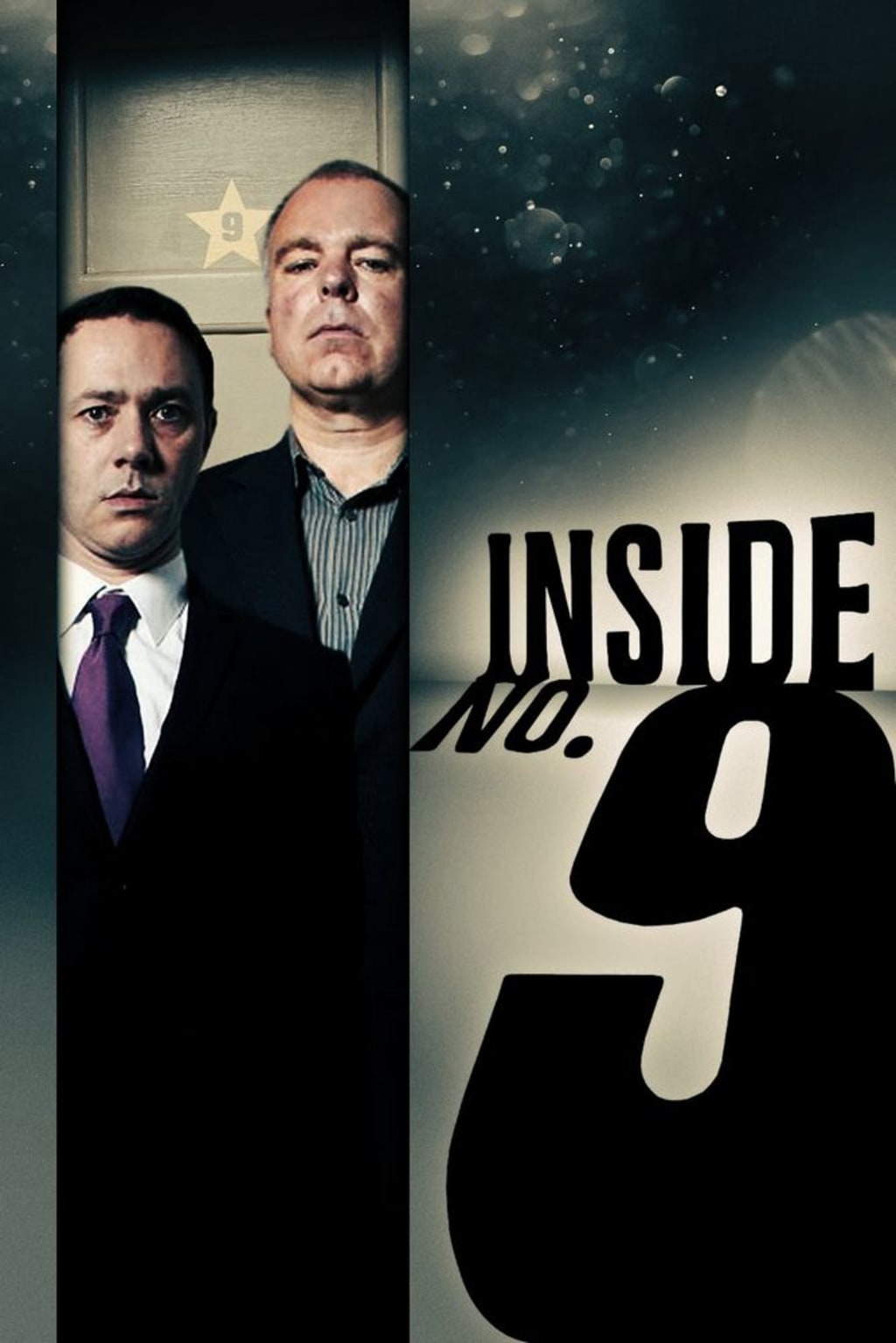
Since it premiered in 2014, Inside No.9, the dark comedy anthology series from The League of Gentlemen co-creators Steve Pemberton and Reece Shearsmith – has consistently proven itself as one of the most inventive and original shows on British TV. The episodes are entirely stand-alone (although one turned out to be a followup to Psychoville) and set in a single location linked to a Number 9 in some way. The 37 episodes so far have varied from lightweight farce to gothic horror, from domestic drama to murder mystery, but the most common format is a seemingly banal event or activity going horribly wrong, usually with a gruesome sting in the tail. Pemberton and Shearsmith have appeared together in all but two of the episodes (Season One featured one episode without Pemberton and one without Shearsmith) accompanied by a large collection of veteran British actors, ranging from Gemma Arteton and Jack Whitehall to Derek Jacobi and Fiona Shaw.
Drawing on the influence of classic anthology series such as Thriller, Tales of the Unexpected, and The Twilight Zone, Inside No. 9 has proved a huge critical success, winning two BAFTAs and eight British Comedy Guide Awards. Even after 6 seasons, it remains consistently popular and acclaimed. Although Inside No. 9 usually keeps things grounded, season 6 is the most fantasy-inspired season to date. Two episodes feature fantastical elements, a third is inspired by the controversies surrounding Game of Thrones, another features several references to Disney’s Dumbo, and a fifth draws on the 16th century theatrical genre of the Commedia Dell’Arte. Therefore, it makes sense to consider them in a fantasy context.
Anthologies are hit and miss by their very nature, so it is unsurprising that some episodes of Inside No. 9 are better than others. But which episodes in Season 6 stood out and which ones ended up underwhelming?
Inside No 9. – Season 6 Ranked
(NOTE: This ranking deals with episodes that are full of surprising twists and turns. There are no specific spoilers, but there are some more generalized reveals about changes in tone and overall conclusions, so viewers who want to go in knowing as little as possible are advised to be careful.)
6. Hurry Up and Wait
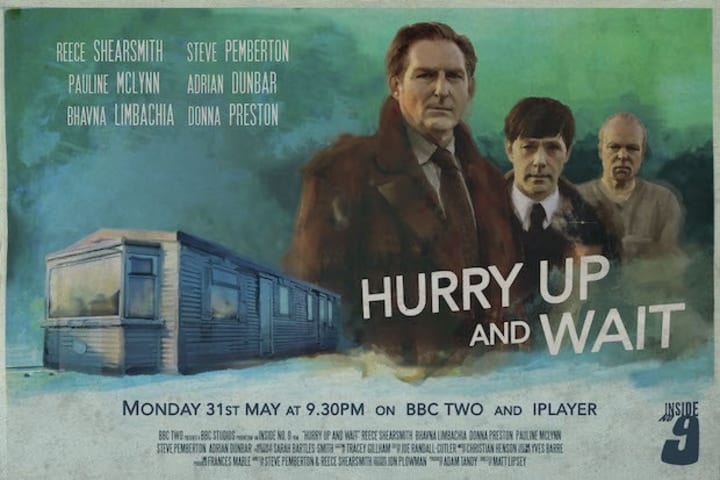
Plot: Twenty years after a baby boy was kidnapped, the story of his disappearance is being adapted into an ITV true crime series starring Line of Duty’s Adrian Dunbar (playing himself). Struggling actor James (played by Reece Shearsmith) has a small role, waiting in a caravan near the set to rehearse his lines. However, he begins to suspect that the strange family who inhabit the caravan might be hiding a dark secret…
‘Meta’ episodes about the entertainment industry have been hit and miss for Inside No. 9, with some of the best episodes of the show ('Bernie Clifton’s Dressing Room') and some of the weakest ('And the Winner Is..') exploring the entertainment industry. Sadly, 'Hurry Up and Wait' is in the latter category. Despite the subject matter, ‘Hurry Up and Wait’ is probably the LEAST violent of the season 6 episodes - considering the eeriness of the caravan location and missing child set-up, this feels like a disappointment. There is also a sense that you could provide a far more vicious satire of the True Crime subgenre, and the way in which the endless of real-life criminality has provided a steady stream of ratings and rewards for the major TV channels.
One of the greatest problems is that the pace feels a little too slow, as we wait for James to become increasingly suspicious of the family, who are not quite exaggerated enough to unsettle us. The most important member of the family trio is the daughter Bev (played by Donna Preston) - a childlike eccentric obsessed with baby dolls and Dumbo - but she pales in comparison to the grotesques seen in Psychoville and The League of Gentlemen. The lack of a true stand-out performance is another reason why 'Hurry Up and Wait' is at the bottom of the pile. It is amusing to see Adrian Dunbar play a more egocentric version of himself, but he needed to be a lot more bizarre and outlandish, and his appearance ultimately feels a bit like padding. There is one final sting right at the end of the episode, which is impressively creepy and elevates things a bit, but it’s too little too late.
5. Wuthering Heist
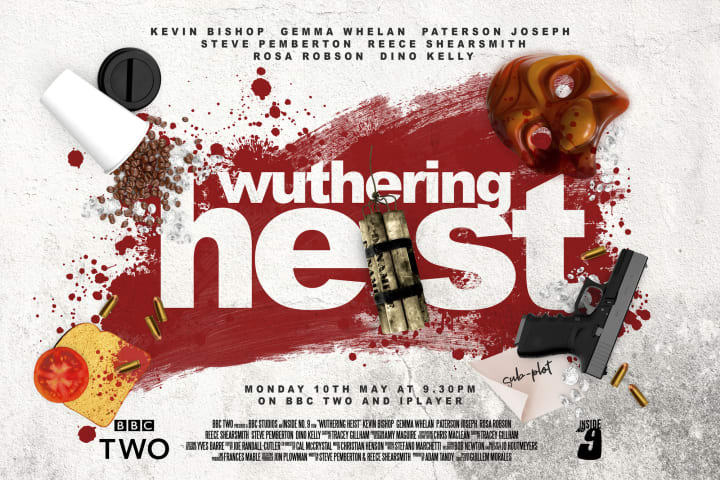
Plot: The gangster Pantalone (played by Paterson Joseph) is planning an audacious diamond heist. Trouble is, he has literally hired a bunch of clowns to help him…
The idea of doing a heist story in the style of Italian Commedia Dell’Arte is inspired (both genres rely on concealed identity, elaborate plans and misunderstandings), but 'Wuthering Heist' is not as audacious as it should have been, combining the raunchy anarchy of the Commedia Dell’Arte, and the violence of the heist genre in a relatively crude fashion. The warehouse setting and “before and after” structure make it pretty obvious the story was based on Reservoir Dogs, and like Tarantino’s breakthrough film, ‘Wuthering Heist’ ends with most of the cast lying dead on the floor. Going from “You’ll be fine – I read the script!” jokes to actual deaths is certainly unsettling, but because most of the characters feel so artificial, it lacks the intended emotional impact. The endless sex jokes and fourth wall humor (including a running joke about ‘Bohemian Rhapsody’) make it harder to invest in most of the cast, so it almost feels like you WANT them to die at the end. Overall, the clash between the two genres ends up highlighting their respective weaknesses.
For all the issues with the writing, the cast seems to be having a lot of fun. Shearsmith and Pemberton play eccentric supporting characters, with sketch show mainstay and former Muppet Treasure Island child star Kevin Bishop being the focal point as foolish “servant” Arlo. However, the two best performers are Paterson Joseph – who provides a charismatic and menacing performance as Pantalone – and Gemma Whelan, whose lively assistant seems to be a couple of steps ahead of everyone else. These two (effectively the nearest things to “straight men” in the story) are responsible for ensuring that we cannot completely detach ourselves from ‘Wuthering Heist’. The scene where the plan for the robbery is revealed is also genuinely impressive, blending theatrical miming skills (and a couple of effectively used props) with energetic cinematic camerawork. However, 'Wuthering Heist' ends up feeling rather insubstantial, and it ultimately pales in comparison to the season 1 episode ‘A Quiet Night In’ – a more original and disturbing fusion of classic comedy formats, lowbrow humor and brutal acts of violence…
4. Last Night of the Proms
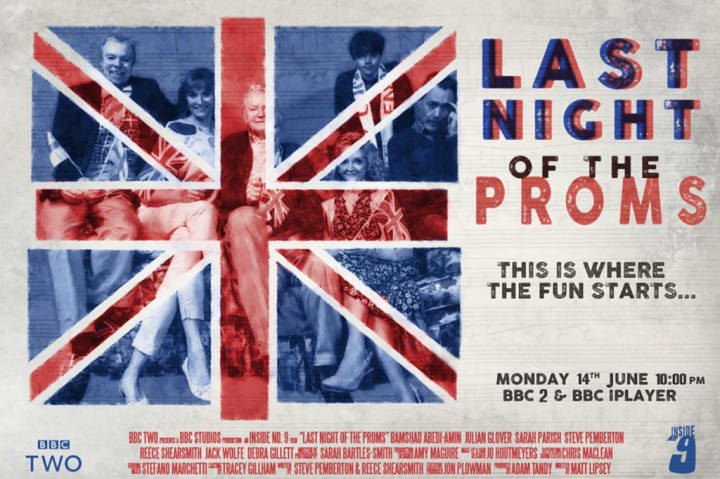
Plot: Brexit supporters Dawn and Mick (played by Sarah Parish and Steve Pemberton) are celebrating the last night of the Proms with their family, including the ardent ‘Remainer’ Brian (played by Reece Shearsmith). However, when a stranger called Yusuf (played by Bamshad Abedi-Amin) arrives in the house, a variety of strange things start to happen…
The next two episodes are both designed to be polarizing, so it’s appropriate they are exactly in the middle of this list. The first of the two deliberately divisive episodes is ‘Last Night of the Proms’, which highlights the sinister side of Britain’s most famous classical music festival. The Gogglebox format of people watching TV lends itself to some amusing moments, as Brian complains about the way classical music is used in popular culture, and Mick tries a little too hard to provide ostentatious Union Jack pageantry. One disappointment is seeing career British villain Julian Glover wasted as a cantankerous grandpa who is pretty much only able to communicate in profanities after a recent illness, and Brian’s son Olly (played by Jack Wolfe) also gets way too little to do. It is two more obscure actors who provide the standout performances. Debra Gillet is the warmhearted grandma who makes the fateful decision to bring Yusuf into the house, whilst Bamshad Abedi-Amin is appropriately innocent as the mysterious stranger, deserving the top billing he receives in the end credits.
Inside No. 9 generally avoids politics, so seeing an episode dealing so bluntly with Brexit, racism and religious belief will definitely surprise fans, and aggravate those with more right-wing viewpoints. The main explanation for this is the fact that many episodes of Inside No. 9* have been inspired by the tradition of social realist TV plays that were BBC staples during the 1960s and 1970s. Most of these were created by unapologetically left-wing filmmakers such as Mike Leigh, Ken Loach and Trevor Griffiths, so it is no surprise that Pemberton and Shearsmith would aim to emulate this. The scenes where the characters argue over Dawn’s secret German heritage, and abuse and insult Yusuf are certainly designed to elicit an extremely negative review from The Daily Telegraph. But the underlying message behind all the provocations is actually pretty profound - our “culture wars” over the Proms have caused us to reject the deeper meaning of the classic songs which have become central to the event. The ability to engage with and explore the deeper spiritual meaning of ‘Jerusalem’ through a dark comedy drama is what ultimately elevates ‘The Last Night of the Proms’ over many of the weaker episodes in the series.
3. Simon Says
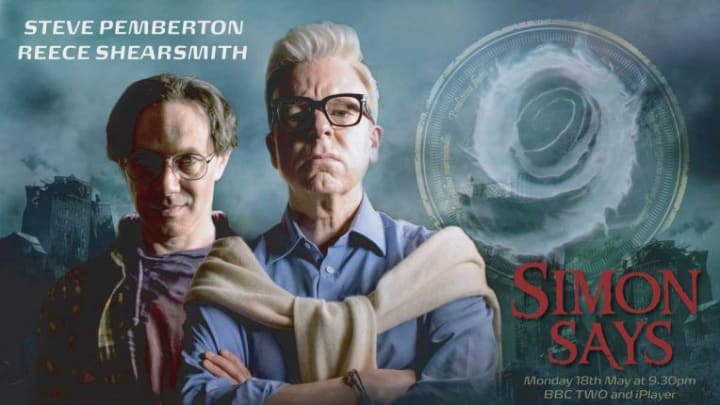
Plot: After the anticlimactic conclusion to his long-running fantasy series The Ninth Circle, screenwriter Spencer Maguire (played by Steve Pemberton) is planning to move onto other projects. But when he ends up in a compromising situation, deranged fan Simon Smethurst (played by Reece Shearsmith) blackmails Spencer into creating an alternate ending for the show…
One of the most creative things about ‘Simon Says’ is the fact that the number 9 in this episode is not a location, but instead part of the show-within-a-show that defines the narrative. The Ninth Circle is an epic ‘swords and dragons’ fantasy show with a fanatical fanbase and infamously disappointing conclusion, and it takes all of two seconds to figure out which real-life fantasy show it is based on (Neither Pemberton nor Shearsmith have appeared on Game of Thrones, but their League of Gentlemen co-star Mark Gatiss has). The main issue with this episode is that it ignores a lot of the ambiguities in the Game of Thrones situation, such as the fact it was based on an existing (but incomplete) series of novels. However, these deviations are necessary in order to emphasize the creative vs fan conflict at the heart of the story. There are times where you have to wonder why Pemberton and Shearsmith chose to create a thinly-concealed knockoff of Game of Thrones when the debates underpinning the episode could be applied to any popular series with a widely panned conclusion, (such as Lost, Star Wars or Line of Duty) but are two simple explanation for this – First of all, the scheming and plotting that frequently featured in Game Of Thrones lends itself effectively to “Life imitating art” scenarios. Secondly, it’s a lot of fun to argue over the Flame of Aurora and get excited over owning the severed head of Thaxos...
Considering that Inside No. 9 has never really had problems with its fanbase, it can feel a bit mean-spirited for Shearsmith and Pemberton to tell a story about entering a conflict with zealous fans, but there have been several tightly contained thrillers based on this core premise. Misery is the most famous of these tales, but the 1982 film Deathtrap (based on a popular play of the same name) is probably a closer relative to ‘Simon Says’, with its constantly twisting narrative and homoerotic subtext. The conclusion to ‘Simon Says’ is relatively inevitable, but there are plenty of shocks and surprises on the way, many of which involve a second fan played with charm and sincerity by Nick Mohammed (to say any more would be too spoiler-ific…). ‘Simon Says’ works pretty well as a thriller, with its creepy set-up and an elegant setting full of hidden corners and blunt objects which unsurprisingly get misused by the protagonists. However, the treatment of Simon’s homosexual tendencies feels a bit too problematic, especially when it leads to the most unpleasant bit of violence in the entire season. In the end, Shearsmith and Pemberton don’t really come down on either side of the “fandom Vs creator” war, with both having good arguments and terrible ideas. Spencer’s final “triumph” feels disturbingly hollow, and this ambiguity gives ‘Simon Says’ a pleasingly uncomfortable edge.
2. How Do You Plead?
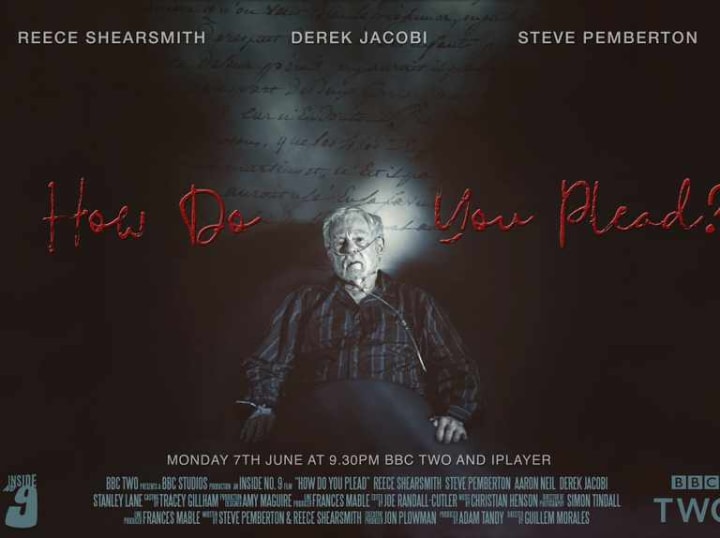
Plot: The famous defense barrister Webster (played by Derek Jacobi) is aware that his days are numbered, so he hires his carer Urban Bedford (played by Reece Shearsmith) to assist him on a special task for his 80th birthday. However, Urban soon discovers the horrifying reason for Webster’s success…
Like ‘The Stakeout’ – the standout episode of Season 5 – ‘How Do You Plead?’ starts as a relatively grounded two-hander before going in a supernatural direction. This is not the first story to link the unusual skills of defense lawyers to the paranormal, but it handles the topic so well, it is impossible to complain. The switch in genre is foreshadowed effectively through some impressive set design and cinematography – the wide shots of Webster’s vast, dusty bedroom and the old-fashioned lift promise some classic Gothic creepiness right from the start. This sense of atmosphere is the biggest strength of the episode, particularly in the scene where Urban learns about Webster’s hidden secret. This big reveal is done with no dialogue whatsoever and keeps us thoroughly hooked – On paper, it would be difficult to liven up a scene where a character browses through documents, but Inside No.9 makes this seem effortless.
Derek Jacobi is the first Inside No 9. Guest Star to appear on the show twice (he previously provided the disturbing commentary for the 2016 Christmas Special ‘The Devil At Christmas’), and he certainly provides a solid performance as the sharp-tongued Webster, going from angry to guilty to sinister with his usual skill. However, Shearsmith is even more impressive, giving his best performance of the season. It does not take long to figure out that Urban is not telling the whole truth about his tragic past, but he remains charismatic and complex enough for us to invest in him. Pemberton has less screen time, but his creepy lift attendant turns out to have a pretty major role in the climax. Ultimately, ‘How Do You Plead?’ is effective because it manages to remain a simple tale of a lawyer learning the hard way that there are some situations he cannot weasel his way out of. Whilst the concept may not be entirely original, it is certainly engaging, and it is impossible to deny the fact that it really does justice to its ideas. ‘How Do You Plead?’ is probably the simplest episode in the entire season, and all the better for it.
1.Lip Service

Plot: Felix (played by Steve Pemberton) suspects that his wife may be cheating on him with a noted political activist. He rents a room in a seedy motel and hires lip-reader Iris (played by Sian Clifford) to help him spy on the couple, but can she really be trusted?
Every so often, Inside No. 9 provides an episode that reminds us why we love this show in the first place. This season, 'Lip Service' is that episode. Without going too far into specifics, the simple story allows for some genuinely unexpected and impressive twists. These twists don’t only change the storyline, they change the genre as well. 'Lip Service' begins in typical Inside No. 9 territory, with its squalid hotel setting where characters discuss the complementary Biscoff packets and a thoroughly unsavory alternative use for tea kettles. It then switches to sex farce, with its innuendo-laden misreadings and scenes where Iris hides in the bathroom whilst an eccentric hotel manager tries to check if Felix has smuggled someone inside his room. The story then mutates into a sad (but gently comedic) romantic drama about a deeply damaged unlikely couple finding happiness in each other, before finally revealing itself as an ultra-paranoid political thriller (It is baffling it took Inside No. 9 so long to do a 1970s style conspiracy thriller!). These changes all feel entirely natural, with the foreshadowing being perfectly clear in hindsight, but also being subtle enough to ensure it remains surprising in the moment, which is all that really matters. Even when you know the surprise, the characters are strong enough for it to work even after repeated viewings.
'Lip Service' is the most naturalistic of the six Season 6 episodes, and this leads to some impressive performances. Steve Pemberton gets to showcase his ability at playing an everyman with a hangdog expression and a lot of hidden vulnerabilities. Sian Clifford is another excellent guest star, as her unpretentious and warm persona makes it easy to root for Iris, even when you are fully aware of the number one rule of Inside No. 9 – No major character is EVER what they appear to be. Shearsmith gets to be more OTT as the ludicrously fussy hotel manager Eric, but he is used carefully enough to avoid being too out of place and distracting. A surprisingly powerful exploration of how easily our surveillance obsessed culture can be exploited, 'Lip Service' is probably the strongest episode of Inside No. 9 since the 2018 Halloween special ‘Dead Line’. Pemberton and Shearsmith have always been masters of a uniquely British combination of the banal and the sinister, and ‘Lip Service’ is the purest and most effective example of this in Season 6 – it definitely deserves its status as the highlight of the season.
Conclusion
Ultimately, Season 6 of Inside No. 9 is one of the weaker seasons overall. With the possible exception of ‘Lip Service’, there isn’t really a truly great episode (There isn’t really anything in the season with the innovation of ‘A Quiet Night In’, the emotional punch of ‘The Twelve Days of Christine’ or the audaciously extreme shock value of ‘The Riddle of the Sphinx’ and ‘Dead Line’), but it still manages to be superior to Season 5. It would have been better if season 6 had featured a bit more subversion of the conventional ‘dark comedy set-up, disturbing conclusion’ formula of the series – even the “unusual” episodes (‘Wuthering Heist’, ‘Last Night of the Proms’) follow this pretty closely. However, there are still plenty of creative ideas, memorable characters, and shocking twists, which ensure that even the weakest episodes are engaging enough to be worth a watch. The show has been renewed for another season, which will start filming over the summer. There are plenty of promising settings left to explore (barbershops, seminar rooms, cinema screens, submarines…) and we can be almost certain that Inside No. 9 has plenty more enjoyably unpleasant surprises to offer in the future…
*The list of Inside No.9 episodes inspired by 1960s/70s British drama is quite long – ‘Last Gasp’, ‘Nana’s Party’, ‘Bernie Clifton’s Dressing Room’, ‘To Have and Have Hold’, and ‘Love’s Great Adventure’ are probably the most blatant throwbacks…





Comments
There are no comments for this story
Be the first to respond and start the conversation.